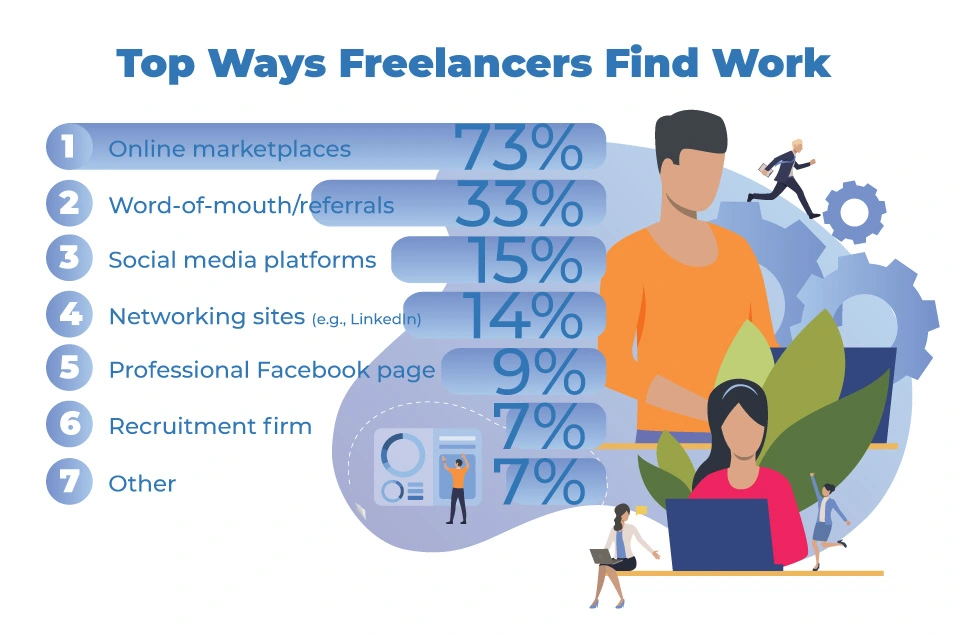Unlocking More Freelance Web Development Opportunities in 2023: 5 Insider Tips
Are you aspiring to make a living as a freelance web developer but finding it challenging to secure enough projects to meet your financial needs? I can empathize with that struggle.
The dream of achieving financial freedom and being your own boss while making money through coding is undoubtedly appealing. However, the roadblock arises when you struggle to attract a sufficient number of clients to propel your freelancing career forward. If this situation sounds familiar, you’re in the right place.
In today’s post, I’m going to share five simple yet effective hacks to help you in freelance web development and secure more freelance web development work, starting immediately. Whether you’re a newcomer to freelance web development or have a few years of experience under your belt, these tips are designed to benefit you.
When you decide to venture into the world of freelance web development, your success hinges on the number of clients you can serve each month. If you find yourself with a shortage of assignments or contracts, sustaining this career may become a considerable challenge.
Consistent workflow is paramount for earning a worthwhile income, especially considering the possibility that you transitioned from a full-time, regular job to become a freelance web developer and get involved in freelance web development. In essence, your livelihood now depends on the work you secure.
So, how can you consistently secure enough orders to ensure long-term sustainability for yourself and your family? Let me guide you through five straightforward and effective freelance web development hacks to find more freelance work and increase your earnings as a freelance web developer. Your success is our priority, and these hacks are tailored to help you navigate the freelancing landscape more smoothly.
#1: Start Networking
Have you informed your former college peers about your transition to becoming a full-time web developer, or have you chosen to keep it under wraps, aiming for a more private lifestyle to do freelance web development or etc?
Interestingly, your most consistent clients could be hiding within your social circle – friends, schoolmates, cousins, uncles, and acquaintances.
Among them, there might be small businesses in need of a new website, or perhaps they’re considering an upgrade or revamp for an existing one. The moment they learn about your web development expertise, the light bulb goes off, and they realize they could benefit from your skills.
Networking’s essence lies in spreading the word – encourage a friend to share with others that you’ve embraced a career as a full-time web developer. Soon, your circle of potential clients will naturally expand.
If you refrain from promoting your skills within your immediate social circles, you might be missing out on excellent opportunities. Overcome concerns about what others might think; take the initiative to send concise, friendly emails to old and new friends, relatives, or anyone within your reach. Make yourself easily approachable, and you’ll open doors to unforeseen prospects.
Though immediate opportunities may not present themselves, networking with peers can lead to valuable referrals today, tomorrow, or even in the coming year. Even if your contacts don’t have projects for you right away, suggesting minor upgrades to their websites is a strategic move. By proposing manageable enhancements, they won’t feel pressured into committing to a large-scale project immediately.
Executing impeccably on these smaller tasks increases the likelihood that they’ll turn to you for more substantial updates when the time comes. Building a reputation for excellence on modest projects positions you as a go-to professional for future endeavors.
Simultaneously, expand your network within your professional domain. Collaborating with peers in your field ensures that if one encounters an overflow of work, others can step in to assist. Beyond your immediate field, forge connections with professionals from diverse backgrounds. This broader networking strategy opens doors for referrals when they encounter projects beyond their specialties.
Consider partnering with a web content creator, for instance, as a valuable collaboration. This cross-disciplinary teamwork not only broadens your professional network but also establishes potential referral channels for projects outside your usual scope. In the dynamic landscape of freelancing, strategic connections can be the catalyst for sustained growth and diverse opportunities.
#2: Provide Top-Notch Quality
The key to retaining clients lies in consistently delivering top-notch web development work. Regardless of how expansive your network is, a client is likely to seek alternatives if you provide subpar services.
This principle extends even to close relationships like friends or relatives. If you fail to offer value for their investment, loyalty becomes a distant prospect. While you may be the best freelance web developer they know (even if they’re not actively seeking the absolute best), it’s crucial to excel at your job, aiming for at least 80% universal appeal and likability.
Acquiring awards may not be in your portfolio yet, but that doesn’t diminish your ability to create impressive designs that are both aesthetically pleasing and user-friendly. Demonstrating your commitment to quality, even without formal accolades, is key.
When you successfully deliver quality work, leaving clients not just satisfied but genuinely delighted, it opens the door to confidently request recommendations. Capitalizing on their satisfaction, you can encourage them to spread the word, enabling you to continuously expand your professional network.
In the competitive realm of web development, consistently providing excellence not only secures existing clients but also acts as a catalyst for organic growth through positive referrals and an expanding network.
#3: Create A Stellar Portfolio Website
How can you demonstrate to potential clients that you possess the capabilities required for the task at hand? Particularly for newcomers, relying solely on your word may not suffice. To establish yourself as the ideal candidate for freelance opportunities, it’s essential to exhibit your skills, experience, and knowledge through the creation of a professional portfolio website.
Your portfolio serves as the foundation for building the brand you aspire to become over time—it essentially functions as your freelance CV. Constructing a freelance portfolio is not an overnight endeavor; rather, it’s a gradual process that evolves as you acquire new clients and engage in diverse projects. The continual acquisition of new skills contributes to the enhancement of your professional profile.
Several online platforms provide opportunities to undertake projects and showcase your abilities, such as Glassdoor, Upwork, and Freelancer.com. Landing your initial gigs for your portfolio may be challenging, but offering your assistance for free in the beginning is acceptable. However, it’s crucial to recognize the value of your skills; refrain from creating overly complex projects for free, aiming for simplicity and efficiency as a teaser for future paid work.
Consider identifying acquaintances or local entities in need of website development—offer your services to friends, local charities, schools, hospitals, or small businesses. Tailor your portfolio to target the right audience, showcasing your capabilities effectively for web development work. Prioritize relevance over quantity when highlighting your achievements; a concise and compelling portfolio eliminates the need for extensive verbal persuasion when seeking potential clients.
In summary, focus on the most pertinent capabilities, avoiding the unnecessary inclusion of unrelated achievements. A well-crafted portfolio not only enhances your professional image but also minimizes the need for verbal persuasion, allowing your work to speak for itself and attracting potential clients more effectively.
#4: Stick To Your Niche
There are instances when being a versatile professional, such as a carpenter, painter, and plumber simultaneously, can be financially rewarding. However, in certain freelance fields, presenting yourself as a Jack-of-All-Trades is not advisable. This approach can raise eyebrows because, as the saying goes, one may end up a Jack-Of-All-Trades but master of none. To establish a distinctive freelance career, it’s crucial to specialize and communicate your specific expertise to clients.
Attempting to cover every aspect of a job may project an image of money-driven greed. The analogy of sticking to your lane, as emphasized on the road, applies here. Discover your niche within the vast field of web development, excel in it, and approach your work with passion and dedication.
Distinguishing yourself from the crowd is best achieved by focusing on your core skills. While being a programmer with broad knowledge in various web development aspects is beneficial, becoming an expert in specific areas makes you more productive and in greater demand.
Clients often have precise needs, and when seeking solutions, they tend to be more explicit. By positioning yourself as an expert in a particular domain, you align with their specific requirements, making you the ideal candidate for their projects. This strategic specialization not only enhances your marketability but also boosts your overall success in the competitive freelance landscape.
#5: Watch Out For The Latest Web Development Trends
As you contemplate your niche, it’s crucial to factor in the prevailing trends in the dynamic digital landscape. Staying abreast of the latest web development technologies and trends is key to understanding the current demands of clients.
Consider, for instance, the contemporary inclination of many business websites toward adopting a “mobile-first” approach. It’s not uncommon to encounter clients who may be unfamiliar with the distinction between a mobile-friendly site and a mobile app.
As a seasoned professional, it’s imperative to recognize that website and app user experiences (UX) are not interchangeable. Despite this, a client might harbor the misconception that replicating the website design directly into an app is a foolproof strategy for maintaining brand consistency, inadvertently setting the app up for failure.
Clients often gauge your tech-savviness by evaluating your ability to elucidate the disparities between outdated and current best practices. Given that many clients lack a clear understanding of their specific digital needs, they seek assurance from you that you’re well-versed in the latest developments.
If you find yourself unable to provide convincing answers to their queries or address their concerns adequately, their confidence in your capabilities can plummet. Hence, the commitment to continuous learning is paramount. The more informed you are, the greater the array of opportunities that will unfold before you. Embrace the ethos of perpetual learning to stay at the forefront of your field and seize the best prospects.
Summing It Up: How To Find More Freelance Web Development Work
Embarking on your freelancing journey, especially if you’re new to the scene, doesn’t have to be a daunting task when it comes to securing your initial freelance gigs.
As you contemplate how to expand your portfolio with more freelance web development work, simplicity is key. Don’t overanalyze the process; instead, follow the tips provided earlier, and make a commitment to consistently deliver on time whenever you land a job.
The critical truth to remember is this: nothing discourages clients more than a freelancer who pledges to complete a task by a specified date only to fall short of expectations.
Therefore, it’s imperative to establish a system for organizing your time and workflow right from the beginning. Additionally, exercise realism when taking on new projects—avoid biting off more than you can chew. Only commit to a job if you are confident in your ability to meet deadlines. This approach not only ensures the quality of your work but also sets the stage for positive client referrals.
In the freelancing realm, success is not just about acquiring projects; it’s about consistently delivering high-quality work on time, fostering client satisfaction, and, ultimately, building a reputation that attracts more opportunities. So, keep things simple, stay organized, and let your reliability shine through.
If you’ve completed freelance web development projects, we encourage you to contribute by sharing your experiences in the comments section below!
What obstacles have you encountered and successfully navigated as a freelance web developer? What key lesson stands out as your most valuable takeaway thus far? We invite you to express your thoughts and insights.


 (
(